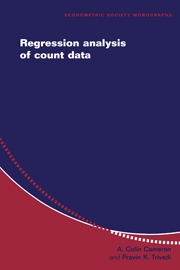Book contents
- Frontmatter
- Contents
- List of Figures
- List of Tables
- Preface
- 1 Introduction
- 2 Model Specification and Estimation
- 3 Basic Count Regression
- 4 Generalized Count Regression
- 5 Model Evaluation and Testing
- 6 Empirical Illustrations
- 7 Time Series Data
- 8 Multivariate Data
- 9 Longitudinal Data
- 10 Measurement Errors
- 11 Nonrandom Samples and Simultaneity
- 12 Flexible Methods for Counts
- Appendices
- References
- Author Index
- Subject Index
- Titles in the series
11 - Nonrandom Samples and Simultaneity
Published online by Cambridge University Press: 05 January 2013
- Frontmatter
- Contents
- List of Figures
- List of Tables
- Preface
- 1 Introduction
- 2 Model Specification and Estimation
- 3 Basic Count Regression
- 4 Generalized Count Regression
- 5 Model Evaluation and Testing
- 6 Empirical Illustrations
- 7 Time Series Data
- 8 Multivariate Data
- 9 Longitudinal Data
- 10 Measurement Errors
- 11 Nonrandom Samples and Simultaneity
- 12 Flexible Methods for Counts
- Appendices
- References
- Author Index
- Subject Index
- Titles in the series
Summary
Introduction
This chapter deals with the topic of valid inference about the population given samples that are not simple random samples. There are several well-known ways in which departures from simple random sampling occur. They include choice-based sampling and endogenous stratified sampling, endogenous regressors, and sample selection.
The departure from simple random sampling may cause the sample probability of observations to differ from the corresponding population probabilities. In general such a divergence leads to models in which simple conditioning on exogenous variables does not lead to consistent estimates of the population parameters. These topics have been studied in depth in the discrete choice literature (Manski and McFadden, 1981). The analysis of count data in the presence of such complications is relatively underexplored.
A second topic considered in this chapter is endogenous regressors. Ignoring the feedback from the response variable to the endogenous regressor leads in general to invalid inferences. The estimation procedure should allow for stochastic dependence between the response variable and endogenous regressors. In considering this issue the existing literature on simultaneous equation estimation in nonlinear models is of direct relevance (Amemiya, 1985). This material is a continuation of section 8.2.
The third topic considered is sample selection in count regression, which also is closely related to issues of simultaneity and nonrandom sampling.
- Type
- Chapter
- Information
- Regression Analysis of Count Data , pp. 326 - 343Publisher: Cambridge University PressPrint publication year: 1998



